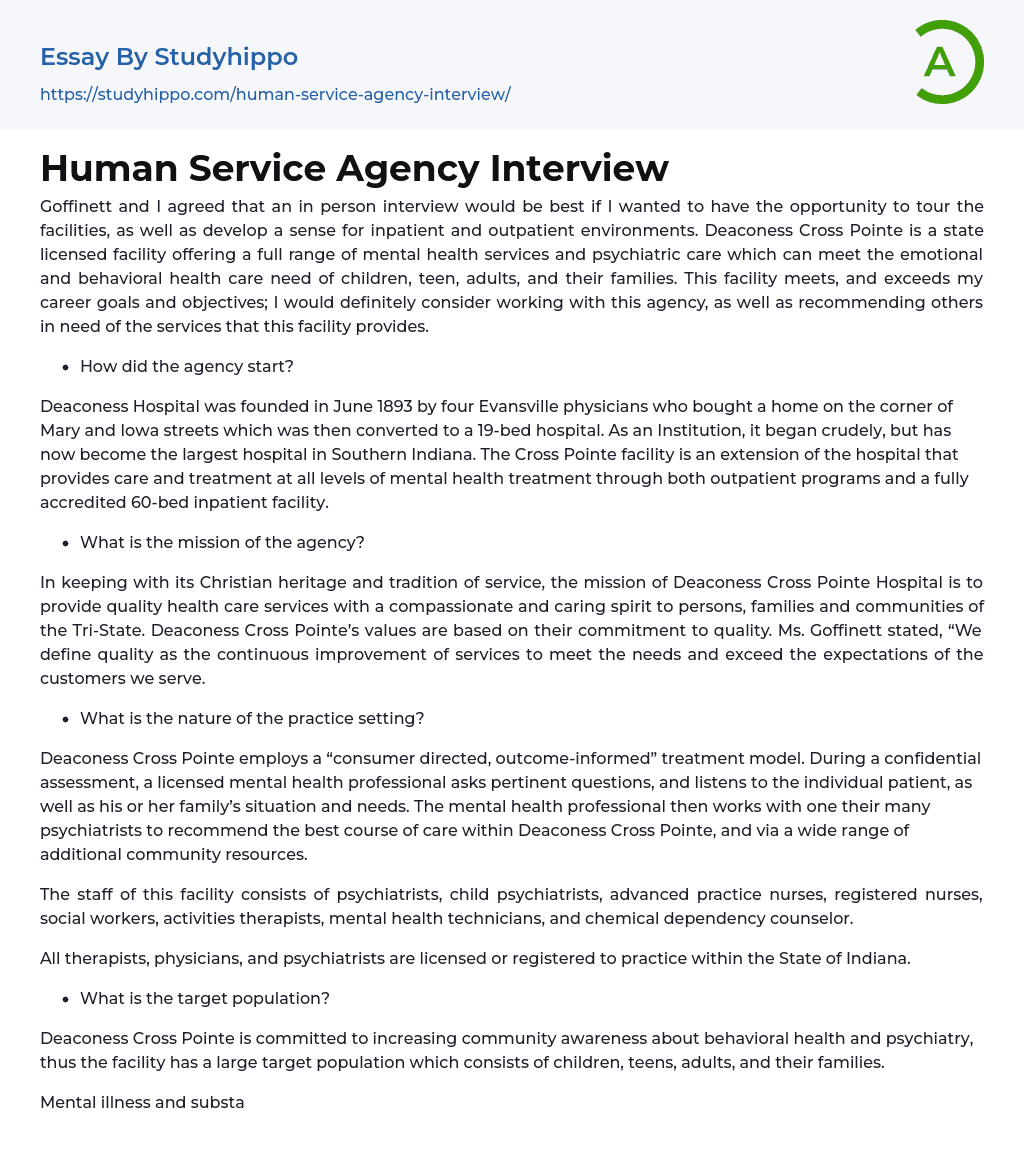Both Goffinett and I concurred that the ideal approach to assess the amenities and comprehend the settings for inpatients and outpatients would be through an in-person interview. Deaconess Cross Pointe is a licensed facility that provides comprehensive mental health services and psychiatric care for individuals, families, children, adolescents, and adults requiring emotional and behavioral healthcare. The establishment surpasses my career ambitions; hence, I am considering working with them while advocating their services to those who require them.
- How did the agency start?
- What is the mission of the agency?
Deaconess Cross Pointe Hospital is committed to providing quality healthcare services with a compassionate and caring spirit to individuals, families, and communities of the Tri-State in accordance with its Christian heritage and tradition of service. Their values are based on a dedication to continuous service
...improvement to meet and exceed customer expectations, as stated by Ms. Goffinett.
- What is the nature of the practice setting?
The team at this facility includes psychiatrists, child psychiatrists, advanced practice nurses, registered nurses, social workers, activities therapists, mental health technicians, and a chemical dependency counselor.
- What is the target population?
Deaconess Cross Pointe recognizes the impact of mental illness and substance abuse on complete families. They prioritize treating the family unit as a whole from the outset, ensuring long-lasting transformations not only for individuals but entire families.
- What are the most common clinical issues the agency addresses?
Deaconess Cross Pointe offers a range of programs to meet the diverse needs of patients, including but not limited to depression, bipolar disorder, chemical addiction
anger management, ADHD, post-traumatic stress disorder (PTSD), anxiety disorders, child and adolescent behavioral problems, and sexual, physical or emotional abuse.
- What services do they provide?
Deaconess Cross Pointe provides an inpatient service that caters to adults who have severe mental health issues, need assessment and treatment, or require substance abuse detoxification.
The acute adult inpatient unit stabilizes crises and helps patients transition to lower levels of care. The unit also provides an inpatient program for acutely ill young individuals. This program focuses on self-esteem development and individual responsibility, aiming to achieve lasting change for both the young people and their families. To ensure a secure and nurturing environment, age-appropriate care is provided with a separate treatment area designated for younger children.
Patients have access to an assortment of services aimed at addressing diverse issues. These include Chemical Dependency Treatment Services, Community Services and Programs, Employer Assistance Program, Special Services, and Individual Outpatient Counseling.
What forms of aid does the organization provide?
Deaconess Cross Pointe provides suicide education and awareness resources for individuals in the community, spanning from adolescents to adults. Among these offerings are ASIST (Applied Suicide Intervention Skills Training), QPR (Question, Persuade, Refer), and Yellow Ribbon programs.
These programs offer a thorough yet non-intimidating approach, outlining clear and effective measures that attendees can readily grasp and apply in an effort to potentially save a life.
- How do they provide these services?
Moreover, the hospital provides comprehensive mental health counseling and psychiatric treatment for children, teenagers, and adults on both inpatient and outpatient bases.
- How are services are funded?
If it is possible to subsidize
the cost of service through agency grants, donations, or fundraising activities, the sliding scale will not be necessary. In addition, Deaconess Cross Pointe bills private insurance and may require a co-payment if applicable.
- How does the agency measure the effectiveness of services?
Deaconess Cross Pointe employs the ORS/SRS questionnaire to evaluate the progress made by the youth and their family members both at the outset and during the course of therapy.
By providing real-time feedback to both the clinician and family, collaboration can occur to identify early progress or a need to change therapy direction.
- Insanity essays
- Bacteria essays
- Biotechnology essays
- Breeding essays
- Cell essays
- Cell Membrane essays
- Cystic Fibrosis essays
- Enzyme essays
- Human essays
- Microbiology essays
- Natural Selection essays
- Photosynthesis essays
- Plant essays
- Protein essays
- Stem Cell essays
- Viruses essays
- Career Choice essays
- Career Goals essays
- Career Plan essays
- Community Service essays
- Dream Job essays
- Duty essays
- Employee essays
- Internship essays
- Interview essays
- Job essays
- Job Interview essays
- Performance Appraisal essays
- Portfolio essays
- Service essays
- Skills essays
- Vocation essays
- Work Experience essays
- Work-Life Balance essays
- Adhd essays
- Antisocial Personality Disorder essays
- Anxiety essays
- Bipolar Disorder essays
- Depression essays
- Depression And Anxiety essays
- Dyslexia essays
- Learning Disability essays
- Major Depressive Disorder essays
- Mental Disorder essays
- Mental Illness essays
- Psychosis essays
- Schizophrenia essays
- Stress essays
- Suicide essays
- alternative medicine essays




